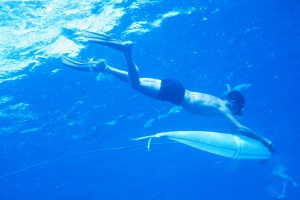Contrary to what our students may sometimes think, there IS fun in the world of science, particularly when it involves water. We are familiar with how we include water in our teaching and learning of most natural sciences: chemistry, biology, meteorology and geology, for example. All of these subjects have several topical sections that involve water. Other disciplines may cover some aspects of water or related aquatic activities. What we are not taking purposeful advantage of is water as a linking subject across the curriculum and a common thread that relates different disciplines and fields of human experience.
One place to start is the recently published book “Water – Global Challenges & Policy of Freshwater Use” by Brooks/Cole Cengage Learning and National Geographic Learning, which I’ve considered using in my oceanography course to enrich the topical section about water. This publication and others in the NGS Learning Reader Series includes concepts, lessons, activities and a media-rich eBook that is appropriate to use across the curriculum.
The Centers for Disease Control and Prevention (CDC) provides useful information on daily water requirements and the American Council on Exercise has a helpful leaflet on Healthy Hydration. If you’d like to estimate your daily water requirements, access this handy Human Water Requirement Calculator.
Moving beyond science disciplines, we certainly can use the topic of water while teaching and learning the arts. Some examples include Handel’s Water Music; music played with Benjamin Franklin’s glass harmonica; the older glass harp usually played in most Renaissance fairs; the design and sculpture of water fountains; and the dynamic art of fountain displays of water and light, commonly found in Las Vegas and in various hotels, convention centers, and performing arts centers around the world.
But examples in engineering are the most notable: hydraulics, flood control, hydroelectric power, and waterways. Why not address the importance of water in the social sciences subjects of human settlements, population distribution, manufacturing, transportation, or geography – truly, the learning possibilities are endless if we are creative.
With good reason, the topic of water as a resource may permeate most academic and practical subjects we teach at the community college. Because of a growing global population, the demand for potable water increases each day, so much that a recent assessment by U. S. intelligence agencies warns that future global conflicts will be over water resources. A photo blog published on March 22, 2012, World Water Day illustrates dramatically how precious this fluid is for the 780 million people without access to clean water.
The question remains of how we can imbed the many concepts and ideas about water to link different disciplines across our curriculum. We are surrounded by pipes, joints, and valves hidden behind our buildings’ walls, so we don’t pay much attention to all the technology and engineering needed to bring all the clean water that we use, spill, and waste. But as teachers and lifelong learners ourselves, the onus is on community college faculty to help our students connect the many roles water plays in our civilization, health, well being and, ultimately, our survival.
One disaster happening now in the Philippines is the destruction caused by Typhoon Haiyan, the largest and strongest storm recorded. The news shows the desperation of the people affected, who ask first for clean drinking water that has become their most valuable commodity. Let’s take this opportunity to ask our students, and ourselves: What would we do in such a situation? How can we be prepared for a disaster of such magnitude? What simple technologies and methods could we use to collect and make drinkable water, if we were under such duress?
We take for granted that we open a faucet and clean, potable water comes out and we don’t even think of it as a precious resource. We need to be reminded that clean, safe water is essential for our civilization and our way of life. And life itself cannot exist without water, at least on this blue planet.

